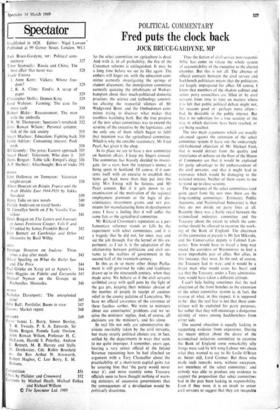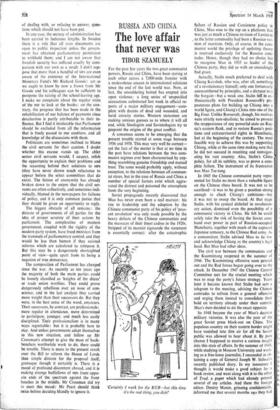Fred puts the clock back
POLITICAL COMMENTARY JOCK BRUCE-GARDYNE, MP
So the select committee on agriculture is dead. And with it, in all probability, the fire of the Crossman reforms is extinguished. It may be a long time before we see its like again. The embers will linger on, with the education com- mittee earnestly investigating the springs of student discontent, the immigration committee earnestly quizzing the inhabitants of Wolver- hampton about their much-publicised domestic practices, the science and technology commit- tee chasing the respectful silences of Mr Wedgwood Benn, and the Ombudsman com- mittee trying to discover what makes that toothless watchdog bark. But the true purpose of the new select committees was to extend the scrutiny of the executive by the legislature, and the only one of them which began to fulfil that intention was the agricultural committee. Which is why the amiable reactionary. Mr Fred Peart, has given it the chop.
In its place we are to have a new committee on Scottish affairs. I keep my fingers crossed. The committee has bravely decided to investi- gate, for a start, how the taxpayer's money is' being spent in Scotland. Of course, if it con- tents itself with an exercise to establish that Scots get back more than they put into the kitty Mrs Ewing will be furious, and Mr Peart content. But if it gets down to an examination of the motivation of the regional employment premium or the logic of dis- criminatory investment grants and SET pre- miums for manufacturing firms in development areas I have a feeling that it will suffer the same fate as the agricultural committee.
Mr Richard Crossman's reputation as a par- liamentary reformer stands or falls by the experiment with select committees, and it is a tragedy that he did not, for once, stay and see the job through. For the kernel of this ex- periment, as I see it, is the adaptation of the relationship between politicians and civil ser- vants to the realities of government in the second half of the twentieth century.
In this as in so many other things Parlia- ment is still governed by rules and traditions drawn up in the nineteenth century, when they made sense. We behave as if the civil servants scribbled away with quill pens by the light of the gas jets, keeping their minister abreast of the number of people in receipt of outdoor relief in the county palatine of Lancashire. We have no official awareness of the existence of these faceless scribes. We write to ministers about our constituents' problems and we re- ceive the ministers' replies. And, of course, all decisions are the minister's, and his alone.
In real life not only are administrative de- cisions inevitably taken by the civil servants, but many strictly political choices are, in fact, settled by the departments in ways that seem to me quite improper. I remember, years ago, hearing a very senior official of the Inland Revenue recounting how he had clinched an argument with a Tory Chancellor about the practicability of a short-term capital gains tax by assuring him that 'the party would never wear it'; and more recently some Treasury officials seem to have thought nothing of warn- ing ministers of successive governments that the consequences of a devaluation would be politically disastrous.
Thus the fiction of civil service non-responsi- bility has come to vitiate the whole system of accountability of the executive to the elected chamber. But this is not all. The absence of official contacts between the civil service and backbench politicians means that the politicians are largely unprepared for office. Of course, I know that members of the shadow cabinet and senior privy councillors are 'filled in' by civil servants from time to time on matters where it is felt that public political debate might not, for reasons good or- perhaps ,more often— bad, be desirable in the public interest. But that is no substitute for a true scrutiny of the way in which decisions have been reached, or are being reached.
The two main arguments which are usually advanced against the extension of the select committee system (1 leave out the endearingly old-fashioned objection of Mr Michael Foot, that it would detract from the quality and importance of debates on the floor of the House of Commons) are that it would be exploited for party advantage to the embarrassment of the civil servants; and that it might lead to exposures which would be damaging to the national interest. Neither of them seems to me to stand up to close scrutiny.
The experience of the select committees (and quite apart from the new ones there are the long-standing committees: Estimates, Public Accounts. and Nationalised Industries) is that they do not divide on party lines at all. Recently there was a battle royal between the nationalised industries committee and the Treasury about the extent to which the com- mittee should be allowed to examine the work- ing of the Bank of England. The chairman of the committee at present is Mr Ian Mikardo, and his Conservative deputy is Colonel Lan- caster. You would have to travel a long way round the corridors of Westminster to find a more improbable pair of allies. But allies, in this instance, they were. In the end, of course, the Treasury had its way; and it would be a brave man who would cross his heart and say that the Treasury, under a Tory administra- tion, would have taken a different attitude.
I can't help feeling sometimes that the real objection of the front benches to the extension of the select committee system is, in fact, the reverse of what, in this respect, it is supposed to be that the real fear is not that these com- mittees will be exploited for party purposes, but rather that they will encourage a dangerous identity of views among backbenchers from either side.
The second objection is equally lacking in supporting evidence from experience. During the recent debate about the desire of the nationalised industries committee to examine the Bank of England some remarkably silly things were said by left wing Labour tvws about %%hat they wanted to say to Sir Leslie O'Brien or, better still, Lord Cromer. But those who made such remarks were, without exception, not members of the select committee: and nobody was able to produce any evidence to support the proposition that select committees had in the past been lacking in responsibility. Even if they were, it is an insult to senior civil servants to suggest that they are incapable of dealing with, or refusing to answer, ques- tions which should not have been put.
In any case, the secrecy of administration has been carried to ludicrous lengths. In Sweden there is a rule that all state documents are open to public inspection unless the govern- ment has obtained parliamentary permission to withhold them; and I am not aware that Swedish security has suffered cruelly by com- parison with our own as a result. I don't sup- pose that more than a handful of MPS are even aware of the existence of the International Monetary Fund's Mr Richard Goode : yet as we ought to know by now a frown from Mr Goode and his colleagues can be sufficient to postpone the raising of the school-leaving age. I make no complaint about the regular visits of the me to look at the books : on the con- trary, the progress that has been made in the rehabilitation of our balance of payments since devaluation is partly attributable to their in- fluence. But I find it intolerable that Parliament should be excluded from all the information that is freely passed to our creditors, and all knowledge of the discussions with them.
Politicians are sometimes inclined to blame the civil servants for their caution. I doubt whether this excuse stands up. The abler senior civil servants would, I suspect, relish the opportunity to explain their problems and the reasoning behind their solutions to ties (they have never shown much reluctance to appear before the select committees that do exist). The fiction of anonymity has already broken down to the extent that the civil ser- vants are often collectively, and sometimes indi- vidually, blamed in the newspapers for failures of policy, and it is only common justice that they should be given an opportunity to reply.
The biggest obstacle of all remains:, the distaste of governments of all parties for the idea of proper scrutiny of their actions by parliament. The complexities of modern government, coupled with the rigidity of the modern party system, have freed ministers from the trammels of parliamentary control, and they would be less than human if they resisted reforms which are calculated to reimpose it. But this may be a dangerously shortsighted point of view—quite apart from its being a negation of true democracy.
The composition of Parliament has changed since the war. As recently as ten years ago the majority of both the main parties could be loosely classified as 'knights of the shires' or trade union worthies. They could prove dangerously rebellious over an issue of con- science, and in the last analysis they carried more weight than their successors do. But they were, in the best sense of the word, amateurs. Their successors, by contrast, are professionals: more regular in attendance, more determined to participate, younger, and much less easily disciplined. Their professionalism is in many ways regrettable: but it is probably here to stay. And unless governments adapt themselves to this new situation, and follow up Mr Crossman's attempt to give the mass of back- benchers worthwhile work to do, there could be trouble. There is more to the present revolt over the Bill to reform the House of Lords than simple distaste for the proposal itself, grotesque though it certainly is. There is a mood of profound discontent abroad, and it is making strange bedfellows of MPS from oppo- site ends of the spectrum against the front benches in the middle. Mr Crossman did try to meet this mood: Mr Peart should think twice before deciding blandly to ignore it.



































 Previous page
Previous page